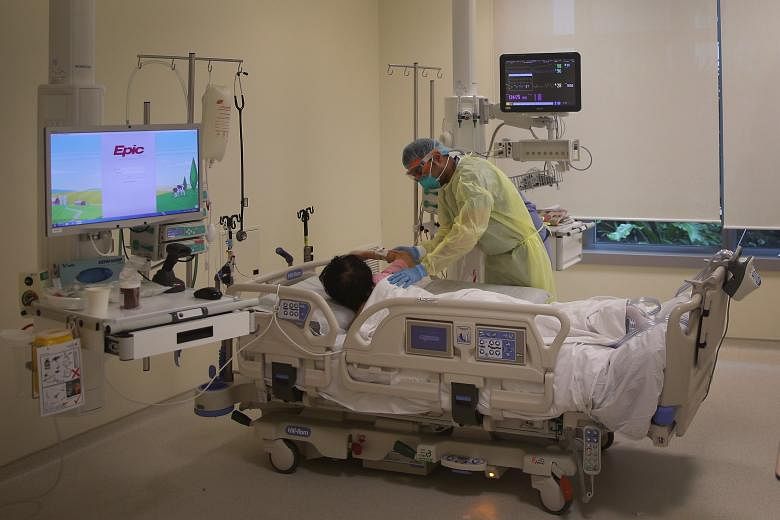SINGAPORE - The recent surge in Covid-19 cases may take a long time to peak and it is not yet time to ease restrictions here, say experts.
But there is a silver lining, as it appears that vaccines are keeping severe cases from rising as quickly as overall case numbers.
Thursday (Sept 23) marks one month since the current wave of transmission began on Aug 23.
From Aug 23 to Thursday, there have been 16,226 new local cases of Covid-19 infection here. Of these, about a third of patients - 5,605 - are aged 40 to 60. Another 1,690 are above the age of 70, and 1,214 are aged 18 and below.
But while the total number of new infections on Thursday - 1,504 - was about 15 times that of the 98 cases on Aug 23, the number of those requiring oxygen supplementation multiplied at a lower rate - about nine times, from 21 to 186, and the number of those in the intensive care unit (ICU) multiplied about thrice, from seven to 23.
Professor Dale Fisher, senior consultant at National University Hospital's (NUH) Division of Infectious Diseases, attributed this to the vaccines.
"They are most effective in preventing severe disease and death. So we expect this number to be low - though not zero - in the vaccinated population... But the unvaccinated are still contributing to the numbers, so the severe cases are not as low as they could be," he said.
Associate Professor Hsu Li Yang, vice-dean of global health and infectious diseases programme leader at the Saw Swee Hock School of Public Health, agreed but cautioned that there is a lag of about a week between the onset of Covid-19 and deterioration, so there is likely to be a rise in ICU cases in the coming weeks.
Prof Josip Car, director of the Centre for Population Health Sciences at Nanyang Technological University's Lee Kong Chian School of Medicine, said there is a need to interpret the numbers with caution, as data such as the extent of the actual spread of Covid-19 in the community is still lacking.
Adding that more time is needed, he said: "For now, if we look at the numbers, it is not realistic to interpret them as being completely independent of each other."
Prof Car also noted that hospitals here are currently running out of space, which justifies restrictions remaining in place.
In the past two weeks, various hospitals, as well as the Ministry of Health and Health Minister Ong Ye Kung, have indicated that emergency departments and general wards are under strain.
Prof Fisher, who is also a professor of medicine at the NUS Yong Loo Lin School of Medicine, said measures should not be eased until the growth in the number of those requiring hospital care falls, which could take "months".
Mr Ong had previously said that it typically takes about 30 to 40 days for a transmission wave to peak before falling and stabilising.
Asked about this, Prof Paul Tambyah, a senior consultant at NUH's Division of Infectious Diseases, said no transmission wave lasts forever.
But he also noted that different countries have seen waves of infection with varying durations, for reasons that are not clear.
Prof Car said the differences between countries means Singapore is in "uncharted waters" now, but added: "It is our hope that through a combination of protection measures and, inevitably, with a significant proportion of the population - preferably younger than older - getting in contact with the virus and building stronger immunity through this, the virus transmission will slow down."
Prof Hsu explained that waves of infection typically subside when there are fewer and fewer people that the virus can infect, making it harder for the virus to maintain a rapid rate of spread.
"This does not mean that the entire population of the country has to be infected first - there will still be a base level of infection after the wave subsides, just like in the case of influenza," he said.
But by this point, he added, most of the population will have either been infected by the virus or are able to consistently maintain a high level of protective antibodies post-vaccination.
Prof Fisher said: "Allowing Covid-19 to become endemic is necessary to regain our lives and livelihoods, as we cannot live the containment way indefinitely. This will mean a lot of transmission for some months, but for those vaccinated, the vast majority - perhaps 99 per cent (of infections) - will be very mild."
He acknowledged, however, that these are "testing times" and that people are concerned about the situation.
Prof Tambyah, who is also a professor of medicine at the NUS Yong Loo Lin School of Medicine, noted that Singapore's medical infrastructure is "very advanced" and the nation has many levers it can pull to deal with rising cases.
These include cancelling elective surgeries in the public healthcare institutions, which will open up a "significant number" of ICU beds.
He added that there is no need to tighten measures further at the moment.
"We already have very tight restrictions compared to most high-income countries and we are still seeing a surge in cases. It is not clear that further tightening will have any benefits," he said.
The experts all agreed that getting people vaccinated and observing safe management measures are still important despite the large number of cases.
"Ultimately, we will have to ride this wave out one way or another," said Prof Hsu.
Prof Car said: "The virus can only work on individuals, so we should never let ourselves be cynical at the collective impact of our own individual actions and should always be socially responsible."













